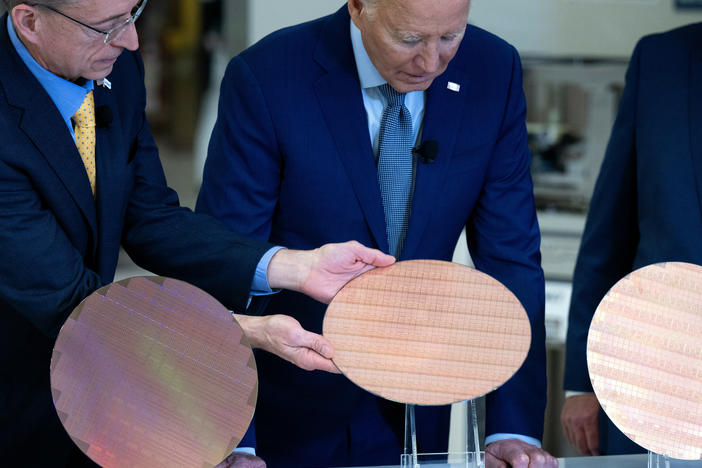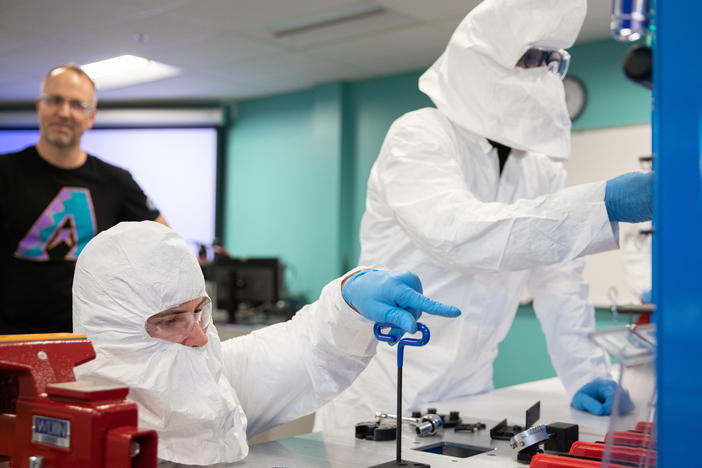Section Branding
Header Content
White House Convenes Summit To Address Supply Shortage Crippling Auto Plants
Primary Content
A lack of computer parts known as semiconductors threatens many industries, hitting automakers especially hard. The White House brought together executives from 19 companies to confront the issue.
Transcript
NOEL KING, HOST:
The auto industry is dealing with a shortage of semiconductors. Those are small computer chips that power your car, your phone, a lot of other stuff you use. Most of them are manufactured in Asia. And because of the shortage, some car factories have stopped producing. The White House is holding a meeting today with executives from dozens of companies. And NPR White House correspondent Scott Detrow is following. Good morning, Scott.
SCOTT DETROW, BYLINE: Good morning.
KING: So car factories stopping production in some cases. How serious is this?
DETROW: Yeah, this is affecting a lot of industries but car - the auto industry the most. Cars are just becoming more and more computerized, like everything else, and demand for cars is really surging right now. There's this huge supply shortage and just not enough semiconductors to go around to make cars. So two more General Motors plants just announced temporary shutdowns because they don't have the materials they need. GM has now paused more than a half-dozen plants. Four Ford plants are temporarily shut down as well, among other automakers.
KING: OK, so real impacts. And then the White House is holding this call with industry leaders. What does the White House want to do about it?
DETROW: President Biden has already ordered a review looking at what the federal government can do to make sure more semiconductors are manufactured in the U.S. and that the supply chain is more steady because there is the supply issue but also a sustained environment of trade wars and more economic nationalism with China in particular. So today, the White House - officials there are meeting with people from 19 different companies across a wide range of industries to talk about the problem. I interviewed Daleep Singh about this. He's a deputy national security adviser in the administration, also the deputy director of the National Economic Council. And he says the White House knows this is a serious economic problem. And when you look at how many other industries rely on semiconductors, particularly the most high-capacity ones, it's a national security problem, too.
DALEEP SINGH: Pharmaceuticals, space but also weapons systems and satellites. So here's the problem - today, 100% - all of the most advanced semiconductors are produced in East Asia. That's a critical vulnerability.
DETROW: The administration wants to spend $50 billion to boost domestic manufacturing of semiconductors. And in the president's infrastructure plan, there's a proposal to spend the same amount of money creating a new Commerce Department office to oversee all of this.
KING: So is this phone call today about the Biden administration selling the Biden administration's infrastructure plan?
DETROW: That is certainly a big part of it. And from the messages we've heard, the White House also seems to be making it clear to these companies that it is ready to intervene. President Biden and his top advisers have centered a lot of policy around the need to make economic interests of middle-class Americans central to both foreign and domestic policy and, just as importantly, to let voters know that they're doing this. And the administration is also taking an active, expansive view of how to use the power of the federal government and making it clear it's comfortable redirecting private industry when they think it's in the national interest. In this case, that would be making sure more semiconductors are manufactured here in the U.S. Singh was really blunt about this in our interview.
SINGH: The reality is that at home or abroad, we don't believe - I don't believe the private sector by itself is going to solve the biggest problems we have in our society - and whether it's extreme levels of inequality and social disparity, whether it's an existential climate crisis or people dropping out of the workforce or stagnant wages.
DETROW: So that's the mindset the administration is taking to so many issues right now. And you could see it at play in this $2 trillion infrastructure proposal, a lot of areas where it would seek to reshape a lot of different industries.
KING: NPR White House correspondent Scott Detrow. Thanks, Scott.
DETROW: Thank you.
(SOUNDBITE OF MENISCUS' "FLUX") Transcript provided by NPR, Copyright NPR.
Correction
An earlier version of this story misspelled John Neuffer's name.
Bottom Content



